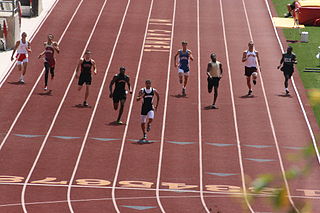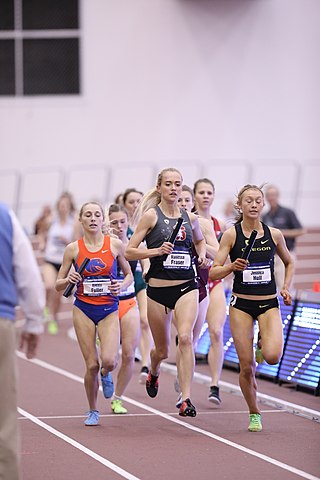
The 400 metres, or 400-meter dash, is a sprint event in track and field competitions. It has been featured in the athletics programme at the Summer Olympics since 1896 for men and since 1964 for women. On a standard outdoor running track, it is one lap around the track. Runners start in staggered positions and race in separate lanes for the entire course. In many countries, athletes previously competed in the 440-yard dash (402.336 m)—which is a quarter of a mile and was referred to as the "quarter-mile"—instead of the 400 m (437.445 yards), though this distance is now obsolete.
The Duquesne Dukes are the athletic teams of Duquesne University of Pittsburgh, Pennsylvania. The Dukes compete in Division I of the National Collegiate Athletic Association as members of the Atlantic 10 Conference. Football and bowling, however, compete in the Northeast Conference.

The distance medley relay (DMR) is an athletic event in which four athletes compete as part of a relay. With its inclusion in the IAAF World Relays program, the IAAF announced on May 1, 2015 that the event would be an official world record event.

The NCAA Division I Men's Outdoor Track and Field Championship is an annual collegiate outdoor track and field competition for men organised by the National Collegiate Athletic Association (NCAA). Athlete's individual performances earn points for their institution and the team with the most points receives the NCAA team title in track and field. A separate NCAA Division I women's competition is also held. These two events are separate from the NCAA Division I Men's Indoor Track and Field Championships and NCAA Division I Women's Indoor Track and Field Championships held during the winter.

The NCAA Men's Division I Indoor Track and Field Championship is an annual collegiate indoor track and field competition for men organised by the National Collegiate Athletic Association. Athlete's individual performances earn points for their institution and the team with the most points receives the NCAA team title in track and field. A separate NCAA Division I women's competition is also held. These two events are separate from the NCAA Men's Division I Outdoor Track and Field Championships and NCAA Women's Division I Outdoor Track and Field Championships held during the spring. The first edition of the championship was held in 1965. The current team champions are the Oregon Ducks.

The NCAA Division I Women's Outdoor Track and Field Championships are the annual collegiate track and field competitions for women athletes representing Division I institutions organised by the National Collegiate Athletic Association (NCAA). Athletes' performances in individual championships earn points for their institutions and the team with the most points receives the NCAA team title in track and field. A separate NCAA Division I men's competition is also held. These two events are separate from the NCAA Division I Women's Indoor Track and Field Championships and NCAA Division I Men's Indoor Track and Field Championships held during the winter. The first edition of the championship was held in 1982.

The NCAA Women's Division I Indoor Track and Field Championship is an annual collegiate indoor track and field competition for women from Division I institutions organised by the National Collegiate Athletic Association. Athletes' performances in individual championships earn points for their institutions and the team with the most points receives the NCAA team title in track and field. A separate NCAA Division I men's competition is also held. These two events are separate from the NCAA Women's Division I Outdoor Track and Field Championships and NCAA Men's Division I Outdoor Track and Field Championships held during the spring. The first edition of the championship was held in 1983. The current team champions are the Florida Gators. The LSU Lady Tigers hold the record for most team titles with 11.

Michael Arthur Norman Jr. is an American sprinter. He previously held the world best time in the indoor 400 meters at 44.52 seconds. Outdoors, his 43.45, set at the 2019 Mt. SAC Relays is tied as the #4 on the all time list. In 2016, he became the world junior champion in both the 200 meters and 4×100 meter relay. In 2022, he became the world champion in both the 400 meters and 4x400 meter relay.

Courtney Okolo is an American track and field sprinter who usually competes in the 400 metres. She starred at Carrollton (Texas) Newman Smith High School where she won multiple individual state championships.
The South Florida Bulls track and field program represents the University of South Florida in the sport of track and field. The program consists of separate men's and women's teams and competes in the American Athletic Conference within NCAA Division I. Both of the Bulls track and field teams are coached by Erik Jenkins, who also coaches the USF cross country teams. The teams practice and host outdoor meets at the USF Track and Field Stadium. While the university sponsors indoor teams as well, the university does not have an indoor track facility suitable to host meets. There is an indoor track in the Campus Recreation Center which the teams use for practice, but it has no space for indoor field events or spectators.
This is a list of the NCAA Division I indoor champions in the 60 meters, 55 meters, or 60 yards. Generally the imperial distance was contested until 1983, the 55 meter dash was held from 1984 to 1999, and the 60 meters was contested thereafter. Hand timing was used until 1975, while starting in 1976 fully automatic timing was used.
This is a list of the NCAA Division I indoor champions in the 400 metres or its imperial equivalent 440 yards. The imperial distance was generally contested until 1983, while the metric distance has been held instead since 1984. The event was not held in 1986 and 1987. Hand timing was used until 1975 and in 1980, while during all other years since 1976 fully automatic timing was used. In 1986 and 1987, the 1⁄10-mile track that the races were run on was 25 inches (640 mm) per lap short, making the actual race distance less than 400 meters those years.
This is a list of the NCAA Division I indoor champions in the 600 yards or its metric equivalent 500 meters. The imperial distance was run until 1983, and the 500 meters was contested for only three years from 1984 to 1987 before the event was discontinued. The 1986 and 1987 races were reported to have been shorter than 500 meters, as the track was 25 inches (640 mm) per lap short in 1986. Hand timing was used until 1975 and in 1980, while starting in 1976 fully automatic timing was used.
This is a list of the NCAA Division I indoor champions in the 800 meters or its imperial equivalent 880 yards. The imperial distance was run until 1983, while the metric distance was contested since 1984. The event was not held in 1986 and 1987. Hand timing was used until 1975, while starting in 1976 fully automatic timing was used. In 1986 and 1987, the 1⁄10-mile track that the races were run on was 25 inches (640 mm) per lap short, making the actual race distance less than 800 meters those years.
This is a list of the NCAA Division I indoor champions in the 1000 yards or its metric equivalent 1000 meters. The imperial distance was contested until 1983, while the 1000 meters was run for 4 years from 1984 to 1987 before the event was discontinued. In 1986 and 1987, the 1⁄10-mile track in Oklahoma City was short by 25 inches (640 mm) per lap, causing the actual race distance to be less than 1000 meters. Hand timing was used until 1975, while starting in 1976 fully automatic timing was used.
The mile run and its metric 1500 metres equivalent have been held at the NCAA Division I Indoor Track and Field Championships since its founding in 1965. With the exception of two 1500 m races contested in 1984 and 1985, the mile is the only event on the NCAA schedule that has not transitioned from imperial measurements to metric. Hand timing was used until 1975, while starting in 1976 fully automatic timing was used. In 1986 and 1987, the 1⁄10-mile track that the races were run on was 25 inches (640 mm) per lap short, making the actual race distance less than 400 meters those years.
The 5000 meters or its imperial 3 miles equivalent have been contested at the NCAA Division I Indoor Track and Field Championships since 1974. It is the longest race on the NCAA indoor track program. The imperial distance was contested until 1982. The distance was not contested from 1983 to 1988, and then the metric 5000 meters was run since 1989. Hand timing was used until 1975, while starting in 1976 fully automatic timing was used. In 1986 and 1987, the 1⁄10-mile track that the races were run on was 25 inches (640 mm) per lap short, making the actual race distance less than 400 meters those years.
The 60 meter hurdles, 55 meter hurdles, or their imperial 60 yard hurdles equivalent, often called the "high hurdles", has been contested at the NCAA Division I Indoor Track and Field Championships since its founding in 1965. The 60 yard hurdles was contested until 1983, 55 meters from 1984 to 1998, and the 60 meters has been run since 1999. Hand timing was used until 1975, while starting in 1976 fully automatic timing was used.
The 3000 meters and its imperial two miles equivalent have been held at the NCAA Division I Indoor Track and Field Championships since its founding in 1965. The imperial distance was contested until 1983, while the metric distance has been run since 1984. Hand timing was used until 1975, while starting in 1976 fully automatic timing was used. In 1986 and 1987, the 1⁄10-mile track that the races were run on was 25 inches (640 mm) per lap short, making the actual race distance less than 400 meters those years.




